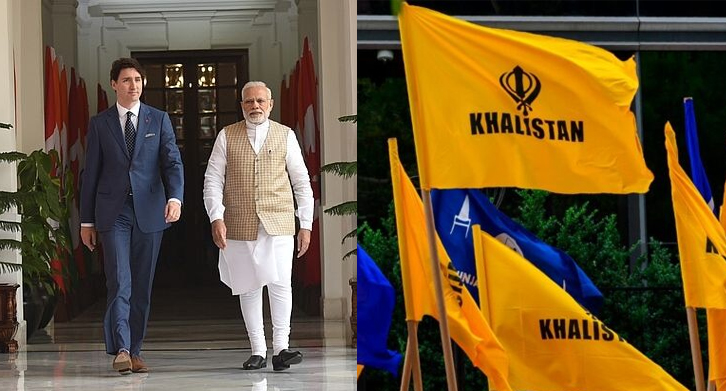Introduction:
The Khalistan movement is a Sikh separatist movement that seeks to create an independent Sikh state in Punjab, India. The movement gained momentum in the 1970s and 1980s, and it was responsible for a number of violent incidents, including the assassination of Indian Prime Minister Indira Gandhi in 1984.
Over the years, the movement has garnered attention worldwide, with various individuals and communities expressing support for Khalistan. Among the countries where this movement has found support, Canada stands out as a significant hub for Khalistani activism and a place where its proponents have sought refuge and garnered resources.
The support of Canada for the Khalistan movement has been criticized by some, who argue that it undermines India’s sovereignty and contributes to instability in the region. However, others argue that Canada is simply upholding the rights of its citizens, including Sikhs.
This article aims to shed light on the Khalistan movement and explore the historical and contemporary support it has received from Canada.
Understanding the Khalistan Movement:
The Khalistan movement emerged as a response to the political and social tensions faced by the Sikh community in India, particularly during the late 20th century. Sikhs, who form a vibrant religious and cultural community, felt marginalized and believed that the creation of a separate Sikh state was essential to protect their rights and promote their identity. The movement gained momentum during the 1980s, marked by violent clashes between the Indian government and Sikh militants.
Canada’s Sikh Diaspora and the Khalistan Movement:
Canada has been a major supporter of the Khalistan movement. In the 1980s, the Canadian government granted asylum to a number of Sikh separatists, and it allowed them to operate freely in Canada. In recent years, the Canadian government has taken a more cautious approach to the Khalistan movement, but there are still a number of Sikh separatists living in Canada who continue to support the movement.
The support of Canada for the Khalistan movement has been a source of tension between India and Canada. India has repeatedly accused Canada of providing safe haven to Sikh separatists, and it has called on Canada to crack down on the movement. Canada, on the other hand, has defended its record on the Khalistan movement, saying that it is committed to upholding the rights of all Canadians, including Sikhs.
The Khalistan movement is a complex issue with a long history. It is unclear whether the movement will ever succeed in achieving its goal of an independent Sikh state, but the support of Canada for the movement is likely to continue to be a source of tension between India and Canada.
Here are some of the reasons why Canada has been a supporter of the Khalistan movement:
- There is a large Sikh community in Canada, and many Sikhs in Canada support the movement.
- Some Canadian politicians have personal ties to the Khalistan movement.
- Canada has a history of supporting separatist movements in other countries.
Supportive Voices and Controversies:
While it is important to acknowledge that the Khalistan movement does not represent the views of all Sikhs, there have been instances where Canadian politicians and individuals have expressed support for Khalistan or advocated for Sikh rights. In the past, some Sikh-Canadian politicians have faced allegations of supporting the movement, although it’s crucial to note that these views are not representative of the entire Sikh community in Canada. The complexities surrounding the issue have sometimes led to controversy and strained relations between India and Canada.
Canada’s Approach and Official Position:
Canada, as a democratic nation valuing freedom of speech and expression, has allowed individuals and organizations associated with the Khalistan movement to operate within its borders. However, it is important to note that Canada does not officially support or endorse the Khalistan movement as a government policy. The country recognizes the importance of maintaining a balanced approach to protect the rights and security of its citizens while respecting international relations.
Security Concerns and Diplomatic Relations:
The issue of the Khalistan movement has at times strained diplomatic relations between India and Canada. India views some pro-Khalistan activities as threats to its sovereignty and national security. These concerns have occasionally resulted in tensions between the two countries, prompting calls for Canada to address the issue and ensure that its territory is not used for promoting or funding any form of extremism or violence.
Conclusion:
The Khalistan movement represents the aspirations of some Sikhs for an independent Sikh state. Canada’s Sikh diaspora has played a significant role in supporting this movement and raising awareness about Sikh issues. While Canada respects freedom of expression and allows individuals associated with the movement to operate within its borders, it does not officially endorse the Khalistan movement. Balancing the complexities of this issue while maintaining strong diplomatic relations with India remains a challenge for Canada. As discussions and debates around Khalistan continue, it is crucial to foster dialogue, understanding, and respect for diverse perspectives to seek peaceful resolutions and ensure the well-being of all communities involved.
The support of Canada for the Khalistan movement has been criticized by some, who argue that it undermines India’s sovereignty and contributes to instability in the region. However, others argue that Canada is simply upholding the rights of its citizens, including Sikhs.
The future of the Khalistan movement is uncertain. However, the support of Canada for the movement is likely to continue to be a source of tension between India and Canada.






